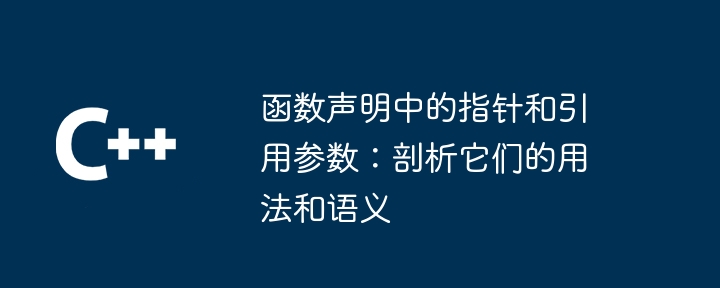 Backend Development
Backend Development
 C++
C++
 Pointers and reference parameters in function declarations: dissecting their usage and semantics
Pointers and reference parameters in function declarations: dissecting their usage and semantics
Pointers and reference parameters in function declarations: dissecting their usage and semantics
May 02, 2024 pm 05:12 PMPointer parameters allow functions to access and modify the original data, while reference parameters must be bound to a valid variable, and changes to the reference are also reflected on the original value.

Pointer and reference parameters in function declarations: a deeper understanding of their usage and semantics
Pointer parameters
Pointer parameters allow functions to access and Modify the caller's original data. Pointer parameters are usually declared as pointers to target types T, as follows:
void modify_value(int* num);
This function declaration indicates that the modify_value function takes a pointer to an integer as a parameter. The integer is accessible to the argument passed to this function, and any changes to the pointed-to value are reflected in the caller's original value.
Practical case:
int main() {
int num = 10;
modify_value(&num); // 传递 num 的地址
cout << num << endl; // 输出 20,因为原始值已修改
return 0;
}
void modify_value(int* num) {
*num = *num * 2; // 修改指向的值
}Reference parameters
Reference parameters are also references to the target type, but they are conceptually different. Reference parameters are represented in the declaration as a reference (&) to the target type, as follows:
void modify_value(int& num);
modify_value The function takes a reference to an integer as a parameter. The argument passed to this function must be a valid integer variable, and any changes to the reference variable are reflected in the caller's original variable.
It should be noted that reference parameters cannot be rebind to different variables, which means that the value passed to the reference parameter must be the entire lifetime of the function.
Practical case:
int main() {
int num = 10;
modify_value(num); // 传递 num 的引用
cout << num << endl; // 输出 20,因为原始值已修改
return 0;
}
void modify_value(int& num) {
num = num * 2; // 修改引用变量
}The difference between pointers and references
Although both pointers and references can access and modify the caller's original data, But there are some key differences between them:
- Directivity:A pointer can point to any valid memory location, while a reference must be bound to a valid variable.
- Rebindable: Pointers can be rebinded to different memory locations, while references cannot be rebinded.
- Overhead: Usually pointers consume more overhead than references because they need to store the address pointing to the target location.
Conclusion
Pointer and reference parameters are useful mechanisms in C for passing and modifying data between functions. Understanding their usage and semantics is crucial to writing code effectively.
The above is the detailed content of Pointers and reference parameters in function declarations: dissecting their usage and semantics. For more information, please follow other related articles on the PHP Chinese website!

Hot Article

Hot tools Tags

Hot Article

Hot Article Tags

Notepad++7.3.1
Easy-to-use and free code editor

SublimeText3 Chinese version
Chinese version, very easy to use

Zend Studio 13.0.1
Powerful PHP integrated development environment

Dreamweaver CS6
Visual web development tools

SublimeText3 Mac version
God-level code editing software (SublimeText3)

Hot Topics
 Concurrency-safe design of data structures in C++ concurrent programming?
Jun 05, 2024 am 11:00 AM
Concurrency-safe design of data structures in C++ concurrent programming?
Jun 05, 2024 am 11:00 AM
Concurrency-safe design of data structures in C++ concurrent programming?
 C++ object layout is aligned with memory to optimize memory usage efficiency
Jun 05, 2024 pm 01:02 PM
C++ object layout is aligned with memory to optimize memory usage efficiency
Jun 05, 2024 pm 01:02 PM
C++ object layout is aligned with memory to optimize memory usage efficiency
 How to implement a custom comparator in C++ STL?
Jun 05, 2024 am 11:50 AM
How to implement a custom comparator in C++ STL?
Jun 05, 2024 am 11:50 AM
How to implement a custom comparator in C++ STL?
 How to implement the Strategy Design Pattern in C++?
Jun 06, 2024 pm 04:16 PM
How to implement the Strategy Design Pattern in C++?
Jun 06, 2024 pm 04:16 PM
How to implement the Strategy Design Pattern in C++?
 Similarities and Differences between Golang and C++
Jun 05, 2024 pm 06:12 PM
Similarities and Differences between Golang and C++
Jun 05, 2024 pm 06:12 PM
Similarities and Differences between Golang and C++
 What are the underlying implementation principles of C++ smart pointers?
Jun 05, 2024 pm 01:17 PM
What are the underlying implementation principles of C++ smart pointers?
Jun 05, 2024 pm 01:17 PM
What are the underlying implementation principles of C++ smart pointers?
 How to implement C++ multi-thread programming based on the Actor model?
Jun 05, 2024 am 11:49 AM
How to implement C++ multi-thread programming based on the Actor model?
Jun 05, 2024 am 11:49 AM
How to implement C++ multi-thread programming based on the Actor model?







